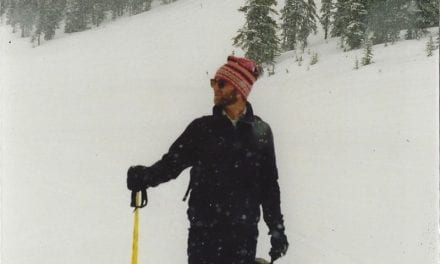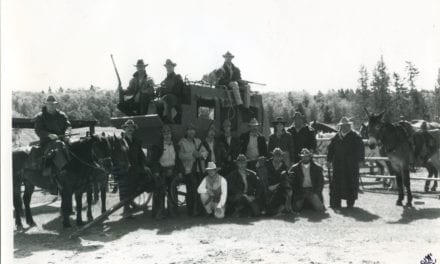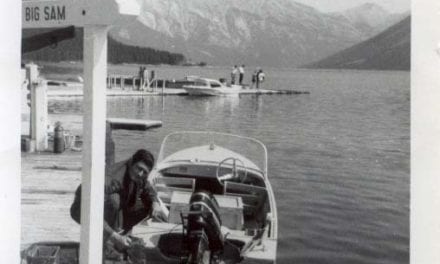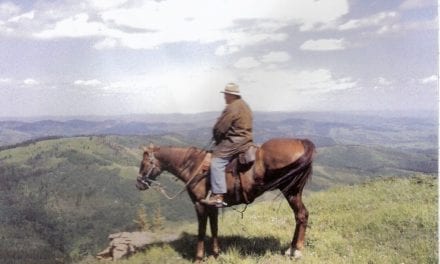MH: How did the Warden Service change over the years? 2725:
GM: I actually saw the changes as gradual and kind of expected. From my perspective, the Warden Service was evolving with the times to address the issues of those times. New technologies were developed; new knowledge came along. From my perspective the biggest and the best change was the development of our own people to address the different ecological, social or operational issues the Parks were facing, rather than relying on people from other departments. So like I said, when I started, and I don’t mean any disrespect to these folks, but for instance the Canadian Wildlife Service (CWS) had a lot of projects going in National Parks and we worked alongside some great CWS Biologists. But for the longest time, we felt like we were (the expression) “hewers of wood and drawers of water”; we were doing the dirty work for these guys. But as Parks hired and developed better educated people, upgraded the education requirements, brought in people with degrees and then with Masters, but still people who could handle themselves in the outdoors, to me it made sense for Parks Canada Staff to be doing these jobs. Our own people knew the parks best and had a better appreciation for the types of things that were acceptable and not acceptable when it came to getting into the Parks or around the Parks. We had great relationships with Canadian Wildlife Services and other organizations, but I do feel that the best thing was the gradual evolution of Parks staff being developed themselves and doing the work themselves rather than relying on people from other organizations. Seeing what was happening with better educated people coming into the Warden Service also served as motivation for me to return to school to finish my degree. In 1993, I returned to University of Alberta and it was probably the best thing that I could have done for my career at that time. Also because we were in Wood Buffalo at the time and had a lot of connections with Edmonton, we were building connections with the University of Alberta and the Boreal Institute so by going back to school there, I helped broaden those connections. The spin offs from going back to school were much more than me getting a degree.
MH: What about the Warden Service was important to you? 3420:
GM: I guess the main thing for me throughout my career was the protection of the things that Parks had set aside to protect. The idea of working towards protecting intact landscapes, marine areas and the species that they supported, was always top of mind. And the other really important thing was working with other people (not just Park Wardens but Interpreters, Laborers, Gate Attendants, Visitor Services staff etc.) who were equally passionate about those things, that was a bonus and the kind of teams that we were able to build to address some of the work that the challenges the Parks faced was critical. The camaraderie, the people and connections we made with people with similar interests. The people were great and we still stay connected with Parks people. My daughter for example just got a job up in Whitehorse and I went with her to self-isolate and deal with quarantine issues and help get her set up. Once our isolation was over, we connected with seven couples all with connections to us from Wood Buffalo and other Parks that were now living in Yukon. Some of them I hadn’t seen for twenty years and it was like picking up where you left off.
MH: Are there any legendary characters or stories associated with the Warden Service that you can share? Is there anyone from the Service that stands out in your mind. 3720:
GM: There are a lot of people who stand out for me but two in particular who set the bar for me personally throughout my career. One of those, and someone you should interview, was Fundy National Park Warden George Sinclair. George was kind of Atlantic Region’s equivalent to some of the more well-known Mountain Parks Wardens. He had actually gone to agriculture college and worked at a potato farm in Fundy before he became a Park Warden. But he found his way into the Warden Service and was an absolute force when it came to getting around the park, usually on foot. He was a hard guy to keep up with whether we were patrolling the rivers or in the bush. And he had like a sixth sense when it came to Law Enforcement. He dealt with some pretty tough situations and was highly respected by locals who would think twice about breaking Park rules. George was kind of like Dennis Weaver, he looked like he belonged on a horse with a Stetson and mustache and he fit the picture of some of the Western Wardens but he was an absolute force in Atlantic Canada. He was also the face of the Peregrine Falcon Recovery Program in the Bay of Fundy. George almost single handedly was the guy responsible for all the birds being released in Fundy National Park and that was a hugely successful recovery. The National Park played a big role and George was the point person for that, a really neat guy.
The other person who I feel was equal to all on the field side but in management was where he shined for me and he was probably one of the most progressive thinkers in the outfit, was Paul Galbraith. He was a Chief Park Warden in many Parks and he hired me in Fundy, where I got my first permanent Warden job. But between hiring me and my going to Fundy, he got transferred to Terra Nova and so I worked under him for a few months there and then I went to Fundy. When we went North he had gone to Jasper and eventually he was successful in getting us into Jasper. Anyway, Paul mentored many of the young Wardens in the outfit and he kind of set the stage in my view for some of the bravest restoration programs in the Parks. He was always challenging some of the current mindsets and traditional human use activities. I think he was kind of years ahead of his time, and in lots of ways, he helped to bring Parks Canada into the 21st century. I was on a couple of hiring boards in my career and one was with Paul, and I will always remember him saying to me as far as guidance for what we were looking for on the board … he basically said, “We are hiring potential. If people don’t know all the answers to the traditional Parks Canada questions, don’t worry about it. We are hiring for potential, people who know how to think outside the box.”. In my view, Paul was responsible for bringing in many great young people to the outfit. To me he was light years ahead of his time.
MH: Is there anything about the Warden Service, as you knew it, that you would like future generations to know? 4420:
GM: I know it has changed with arming and things like that, but one of the main things for me about the Warden Service is that it was always the last and best line of defense within Parks Canada, to try and prevent some of the decisions and developments within our parks that contradicted why these Parks were set aside in the first place. It’s not that there weren’t other staff who weren’t equally or even more passionate about protecting our parks, but the Warden Service’s and Resource Conservation’s roles included assessing and evaluating proposed developments so we really were the point people for giving advice as to whether projects should proceed or not. After arming, which I thought was inevitable, the Warden Service changed in a way that it didn’t have to. I voiced those concerns to Allan Latourelle (the Chief Executive Officer at the time) as those changes were happening but he and I never saw eye to eye. It was interesting because I felt that arming was just part of the toolkit for 21st century conservation Law Enforcement, but what I think should have happened, and I told Allan Latourelle this, was similar to what happened with US National Park Service Rangers. There, they are all Rangers, but some are Interpreter Rangers, Visitor Activity Rangers or Law Enforcement Rangers, and I thought it should be the same with our Wardens … we could have been designated Park Warden – Law Enforcement, Park Warden – Public Safety, Park Warden – Ecosystem Management, etc. but like other people have told you, there was a bit of a vendetta against the Warden Service because of how the arming issue unfolded, so what we have now is not what it could have been. That’s not to take away from the men and women who are in the Warden Service right now but that decision ultimately changed the Warden Service forever. If I was Chief Executive Officer for one day, I would change that back.
MH: What made the Warden Service such a unique organization? 4935:
GM: So like we have been saying, most often it was the unique characters, the men and women we worked with who were so passionate about protecting the Parks. People that were at the front end of pretty much every controversy facing our parks who had to stand up for what they believed in. And as I said before, they weren’t unique to the Warden Service, many were labourers, interpreters, managers and so on. I think Parks Canada was and still is incredibly lucky to have so many great people who share similar passions for the wild spaces and species that live there and that Parks set aside to protect.
5038: Parks didn’t necessarily appreciate their great staff. When I retired in 2012, two things I’ll just mention; I was born in 1957, the same year Terra Nova was created as a National Park, which is where I say I grew up and because I started young at 18, I always knew I would work until I was 55 and then retire. It wasn’t that I didn’t like my job, I had my retirement date picked and it ended up being that my last day of work was just before what became known as black Monday where the cuts hit in 2012. I feel super lucky that I worked through that period but I was kind of devastated by what happened in 2012 and so much of what happened then, went on to influence what I’ve done since. I was there the last few days when people knew something was coming down the tubes and I knew people were going into meetings with Managers on the Thursday and Friday and being told that come Monday they may not have a job. People were coming out of those meetings in tears, so for the last two days of my career I spent it trying to console people. But as devastating as it was, the people who lost their jobs landed on their feet. It was kind of funny because around here there were a few people who were anti-government and they had no problem with the idea of Parks Canada making all these cuts, but I said to them, “You know you shouldn’t be so coy about this because what’s going to happen is these people being cut from Gulf Islands are going to apply and compete on jobs in your organization and they are going to win them.” and that is exactly what happened. Four people ended up getting on with Capital Regional District Parks here and I had to laugh because Parks Canada gave up some of their best people, but those people didn’t suffer for finding work. It was totally Parks Canada’s loss.
Parks did some weird things during that time. Here in the Gulf Islands, the Park was transitioning from an establishment budget (for a new park) to its regular operational budget, so there was probably going to be a reduction anyway, but at the end of the day, it was almost a 40% cut to Parks staff. I made comments that because we were in Green Party Leader Elisabeth May’s riding, we took an especially hard hit but I don’t know if it had anything to do with that. I had just finished and I was starting to get into writing and I had started this blog. I never expected to be a blogger but I was blogging and when that happened, I was kind of in tears and I wrote a blog called “Worst Day”. Someone contacted me and said that Elisabeth May had just re-tweeted my blog and at the time I could track how many hits my website was getting and I’d be getting like 20-30 hits a day and that day I got 6000.
But still at the end of the day, no matter how much the outfit suffered then, I still think Parks has people that are second to none. And I always say that when you come to work in these places, places like Gulf Islands, even if you didn’t previously work for national parks, when you’re out doing your work and you run into a pod of Orcas for example, you cannot help but be inspired, the same as when you’re in Jasper and see a grizzly or a herd of elk or a herd of Bison in Wood Buffalo. It’s hard to be complacent about these places when you see the types of areas we are lucky enough to work in.
MH: Do you have any lasting memories as a Warden? 1:00:00
GM: So many right. One of my favourite cabins is Park Harbour in Terra Nova. In order to get to it you have to go by boat, and back in the day we had these open wooden boats with small engines on them and you had to go around this headland, Hurloc Head. Beyond Hurloc Head was England so it’s literally the open Atlantic! But when you got into Park Harbour there’s this beautiful little cabin nestled in this cove. That was definitely a favorite place and there are many stories that involved Park Harbour.
But I want to leave you with a favorite story that goes back to the Bison issue in Wood Buffalo. In the north, you become an avid CBC radio fan so we were surprised to hear the comedy duo Double Exposure, (Bob Robertson and Linda Cullen), do this piece about the Bison slaughter called “Bart the Buffalo” where they had this buffalo that ends up getting a gun as well as guns for all his friends and they start shooting at the folks who were brought to the park to shoot at them. It was just hilarious. The group that we had formed in Wood Buffalo to try and battle the slaughter was called BERT (Bison Emergency Response Team) so when we heard the Double Exposure piece I called CBC and asked if I could speak to either Bob or Linda. I figured there’s no way I’ll be able to speak to these folks cause I’m a nobody, but then Bob Robertson came on the phone and I told him who I was and where I worked. I asked if we could get a copy of the Bart the Buffalo piece and he said, “Well, normally CBC doesn’t do that, we only send it out under special circumstances, but we kind of feel that you guys are special so I’ll send a copy in the mail”. That next week I got this cassette of the recording and now it’s posted on my WriteNature website. It was kind of neat to speak with Bob and we shared a few laughs but it was especially nice to get a copy of that skit. You can check it out at https://writenature.com/rants-and-roars/bart-the-buffalo/
MH: Do you ever miss being a Warden? 010333
GM: Yes I do but we are still very connected to so many people we worked with. I’m really appreciative of having been able to work as a Warden and to have moved around and worked in six different National Parks and have so many friends. But for me it was time to move on, I had other passions I wanted to pursue. Still, I used to say that part of my role was like roller derby, to reach behind and grab a younger hand and help push them forward in the outfit, to open the door for younger people waiting for their opportunity to get into the outfit. The last few years of my career I had many young folks working with me in the ecological monitoring program who I feel I helped mentor and they are all onto paths that have an ecological aspect to their jobs. In the end I was happy to move on and give others an opportunity to do some of the jobs I had a chance to do.
MH: Do you have any photos of yourself as a warden that you would like to donate? Artifacts? What do you enjoy doing in retirement? 010500:
GM: I’ll have a look. I don’t have a ton of pictures of myself, mostly others. Things like the link to the Double Exposure segment is something I can donate. As for what I enjoy in retirement, it’s still about getting out but I guess the main thing I’m enjoying is writing and the main things I’d like to leave behind are stories. One of the park wardens in Terra Nova actually brought the log book from Park Harbor Cabin into town when we were in Newfoundland a couple of years ago, and I took copies of about 50 pages from the log book. Other Wardens would go and write the name/date in the log book and I would often write a story. And so part of it for me has always been to write some of these things down. I wrote lots of technical stuff kind of quasi-scientific stuff over the years and I figure in my retirement I’d try the fictional angle to try and attract readers who don’t read non-fiction or technical stuff to stories about our national parks. That’s the stuff I’m trying to leave behind with the fiction series I’m writing about national parks called Dyed In The Green. (We talked about the sketch and write up I’d found on Park Harbour which turned out to be on George’s website – Jennifer Hoffman, a Warden in Gros Morne, did the sketch). I guess between the series and my websites like WriteNature (writenature.com) and georgemercer.com, those will be my contribution.
MH: What year did you retire?
GM: 2012
MH: Is there anything I haven’t asked you that you think I should know about the Warden Service? 1:10:
GM: I think it’s been very comprehensive. I think it’s great you guys are doing this. I should get more involved but I’ve been really focused on getting books out and telling different stories and that’s probably going to be my focus until the day I expire.
MH: Anyone else to interview?
GM: A lot of the older Wardens who were mentors to me have passed away. Aside from the list I emailed, the only other person would be Eugene Taylor, a Warden raised in Newfoundland, worked Gros Morne area and Wood Buffalo, can’t remember other Parks. I believe they live in Newfoundland again but not sure.
Emails with info:
1 – “Some other folks you should interview include George Sinclair (Fundy), Roger Baird (Terra Nova, Gros Morne and Riding Mtn.), Barb Linehan (Terra Nova).
George was the quintessential Atlantic Canadian Park Warden and was to the East Coast what some of the more famous mountain national park wardens were to the Rockies, Roger was the first Dog Master in Eastern Canadian national parks and Barb was another one of the first women in the Warden Service in Atlantic Canada.
Cheers George”
2 – “A few other people that come to mind if you haven’t already spoken with them are Lou Comin, Rob Walker and Todd Golumbia.( toddg@telus.net) WRT to Lou, he was one of the strongest Chief Park Wardens I worked for when it came to standing up for park values and in my view was the key person responsible for getting logging out of Wood Buffalo National Park. I have a lot of respect for him and so many others.
Cheers George
This interview was conducted by Monique Hunkler.
Monique Hunkeler first started working with Parks Canada in 1989 as Secretary to Banff National Park Finance Manager. She moved into a position as Dispatcher for the Banff Park Warden Service and later worked within Banff National Park and Town of Banff’s IT departments. She is experienced with the interviewing, transcription and archiving process the Park Warden Service Alumni Society.



